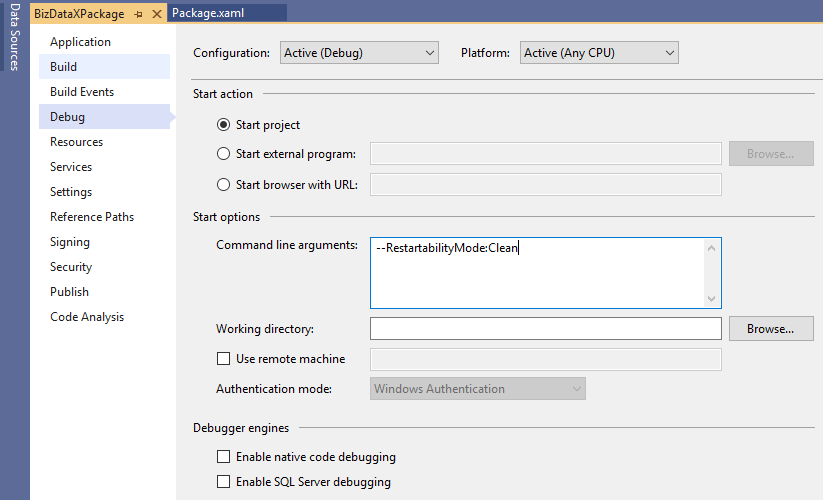Restartability
Restartability is a feature of the BizDataX tool that enables re-starting the package execution from the point where the previous execution attempt was interrupted and stopped for some reason.
| Table of contents |
|---|
| Restartability store |
| Restartability mode |
| Starting a restartable package execution |
| Restartability process |
Restartability store
Restartability is not enabled by default and needs to be configured by defining the restartability store. For configuring restartability stores check datasource specific sections: Oracle, Microsoft SQL Server, DB2, Informix and Sybase.
The restartability store is a table of a default name RESTARTABILITY_ITERATORS where the statuses of the masking units are going to be stored during the package execution.
Restartability mode
Package execution can be started in selected restartability mode:
| Restartability mode | Description |
|---|---|
Off (Do not use restartability) |
Restartability option is not enabled in package execution. This mode is typically used when it does not matter whether the package is going to be executed from the beginning or from the moment where the previous execution failed. |
Clean (Use restartability) |
In this mode RESTARTABILITY_ITERATORS table is created where during package execution unit statuses are saved. This mode cannot be used if statuses from previous runs exist. This mode is typically used in the first package execution with restartability option enabled. |
ForceClean (Use restartability and delete any information from last run) |
Content of the RESTARTABILITY_ITERATORS table is deleted and package execution starts from the beginning. This mode is typically used when some units statuses exist, but they need to be ignored i.e. deleted. |
Continue (Continue from previous execution) |
Package execution includes units that are in status Queued. Restartability option cannot start be used with this mode if previous execution finished all the work. This mode is typically used when it is assumed that the cause of the previous failed execution has been removed and that the next execution will pass successfully. |
The first package execution should be in Clean mode.
Starting a restartable package execution
Package execution can be started from Visual Studio, from Portal and from the command line. Restartability mode is defined as an optional command line argument. If not written, the value will be Off.
- When started from Visual Studio, by going to Solution Explorer -> right-click on project -> Properties -> Debug -> Start options -> Command line arguments field, the restartability mode is defined in the following form:
--RestartabilityMode:Clean
Figure 1: Visual Studio Properties
When started from Portal, user must select one of the restartability modes before starting the package execution. The default offered mode is Do not use restartability.
When started from the command line, the package is started in the following form:
BizDataXPackage.exe --RestartabilityMode:Clean
Example: C:\Users\Administrator\source\repos\BizDataXPackage\BizDataXPackage\bin\Debug>BizDataXPackage.exe --RestartabilityMode:Off
Restartability process
Each package consists of masking units (package workflow steps, table partitions, table segments). During a package execution, the status of each unit is saved so that the next package execution includes only units that did not finish with success.
Statuses are Finished, Running, Queued and Failed.
Below is an example with a couple of records from RESTARTABILITY_ITERATORS table:
Masking of some values in one of the units was unsuccessful (State Queued). Therefore, no value in that unit is masked and execution needs to be repeated in order to do that. The values in other two units are masked successfully. In the next masking attempt, the values from only that units will be masked, of course, if other conditions for masking will be provided correctly.
| PackageId | Unit | State | Unit description |
|---|---|---|---|
03d83661-2766-43b0-956f-baa578cb2b7d |
03d83661-2766-43b0-956f-baa578cb2b7d |
Queued |
Package |
03d83661-2766-43b0-956f-baa578cb2b7d |
Customer({table}.ID<100000)[] |
Queued |
Table segment |
03d83661-2766-43b0-956f-baa578cb2b7d |
Customer({table}.ID>=100000 and {table}.ID<200000)[] |
Finished |
Table segment |
03d83661-2766-43b0-956f-baa578cb2b7d |
Customer({table}.ID>=200000)[] |
Finished |
Table segment |
03d83661-2766-43b0-956f-baa578cb2b7d |
step:8d969d34-7e58-4121-a4d9-e23063c0c95b |
Queued |
Package step |
If the package has more than one masking engine, if applicable, it is recommended to set their ContinueOnIteratorFail properties to true in order to continue the package execution by going to the next masking unit if the previous one failed.
